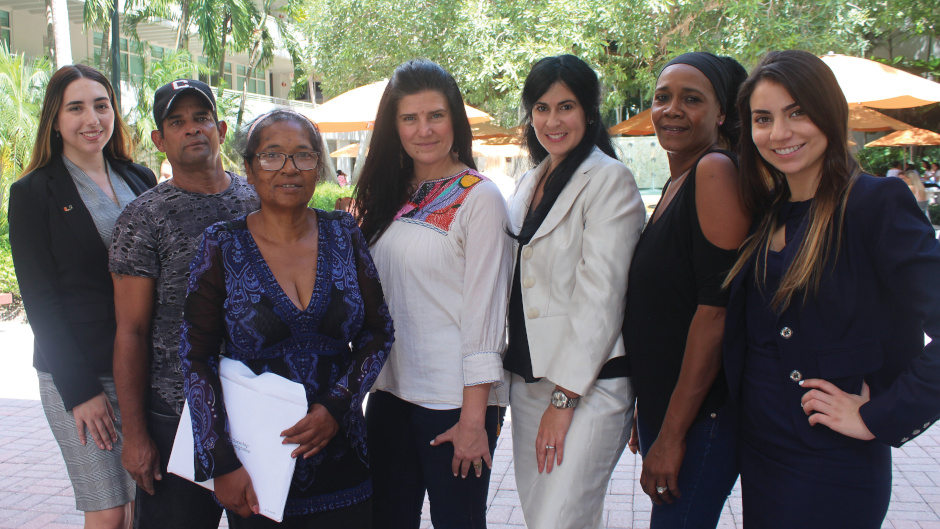Three cheers for Miami Law’s Health Rights Clinic for three recent wins.
“These are the first clients these students have ever represented,” said the clinic’s director JoNel Newman. “They started school on August 12, 2019, and have already changed their clients’ lives.”
The clinic, established in 2005, is a medical-legal partnership operated in collaboration with the UM Miller School of Medicine, representing low-income and underserved communities. Law students function as the client’s primary advocates and conduct intakes, legal research, file pleadings and legal documents, develop case strategies, and provide representation in administrative hearings and court.
Naturalization Appeal Win at U.S. Citizenship and Immigration Service
Third-year law student Lietty Mejias, under the supervision of Associate Director Melissa Swain and Yasminat Assis-Reveiz, won a naturalization appeal at the United States Citizenship and Immigration Service Miami Field Office for a severely disabled Cuban refugee.
USCIS had previously denied the refugee twice. The clinic has been representing the disabled woman and her family since 2016, and Mejias was able to prevail at the most recent hearing. Now, as a U.S. citizen, the woman will be able to receive life-sustaining disability benefits.
“Representing the client was both challenging and emotional,” said Mejias. “Challenging because it was our last opportunity to show her impairments before going into a long federal process. It was emotional because I identified with her, maybe because we are both Cuban or maybe because we are both women. The favorable result from the hearing was a win for me as much as it was for her. I will always remember her and her case as the first time I prevailed in a hearing.”
Hearing Win for Disabled Former Political Prisoner
Second-year law student Emely Sanchez, under the supervision of Swain, won a Naturalization hearing at the USCIS Miami Field Office for a severely disabled and former political prisoner, a Cuban refugee.
The interdisciplinary team, including forensic psychiatrists on fellowship rotation in the clinic, obtained disability waivers and US citizenship for the client. Now, as a United States Citizen, he will be able to continue receiving life-sustaining disability benefits, which had been halted due to naturalization.
“It is rewarding to know that now as a citizen, our client will have access to the life-saving medical benefits he needs,” said Sanchez.
Win for Domestic Violence Survivor
Second-year Estefania Re, under the supervision of Swain, also won a naturalization appeal at the USCIS Kendall Field Office for a severely disabled and homeless Cuban domestic violence survivor. The Clinic’s interdisciplinary team, including forensic psychiatrists on fellowship rotation in the clinic, completed winning disability waivers for the patient-client. Now, as a U.S. citizen, she will be able to receive life-sustaining disability benefits, move out of the homeless shelter, and secure permanent housing with her daughter.
“The clinic has reiterated that I came to law school to obtain knowledge to give back to the community,” said Re. “Working with my clients, who often feel there is no way out of their current situation, has only exemplified that I need to use the law to help people. Without the clinic, my client would not have been able to become a citizen. She needed legal assistance as well as someone to give her the courage to survive the process.”
Law Students Benefit from Clinic Experience
Under the guidance of Newman and Swain, Health Rights Clinic students spend the academic year representing low-income patients from the University of Miami, Division of Infectious Diseases, Sylvester Comprehensive Cancer Center, and other medical partners.
“Our clinic students are providing direct access to justice for these clients,” said Swain. “The clinic represented all three of these clients because they have nowhere else to go. They can’t afford to pay a private immigration attorney.”
Re agrees, “As future lawyers, we are tasked with listening to our clients and giving them the confidence to persevere while using the law as a foundation. This is the type of work that makes me so proud to be a part of the Health Rights Clinic and excited for the year ahead.”
More on the Health Rights Clinic

